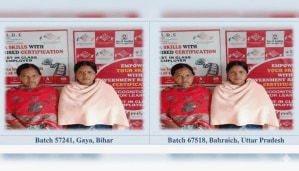Stay updated with the latest - Click here to follow us on Instagram
In defence of the Collegium System: ‘No other constitutional authority suitable to initiate, recommend names for elevation’
There has been a constitutional debate centering around the Collegium system for appointment of judges to the constitutional courts. The Collegium system has been described as opaque. Difficult to understand.
 The top court had said there were 3,000 pending petitions pertaining to matrimonial cases where parties are seeking transfer of cases. (file)
The top court had said there were 3,000 pending petitions pertaining to matrimonial cases where parties are seeking transfer of cases. (file) Written by Dr Balram K Gupta
The last four to six weeks have been most engaging. There has been a constitutional debate centering around the Collegium system for appointment of judges to the constitutional courts. The Collegium system has been described as opaque. Difficult to understand.
This system operates both at the high courts and Supreme Court level. Article 124 (2) envisages that the judges of the Supreme Court are to be appointed by the President after consultation with such of the judges of the SC and of the HCs as the President may deem necessary for this purpose. Equally, Article 217 requires that the judges of the High Courts shall be appointed by the President after consultation with the Chief Justice of India, the Governor of the state, and, in the case of appointment of a judge other than the Chief Justice, the Chief Justice of the High Court. The Constitution is silent about the process of consultation. The same has been evolved through judicial review. This silence of the Constitution has been filled up through different cases which came up before SC. The Collegium system centers around the ‘consultative’ process.
The Collegium consists of different constitutional authorities as required by both the Articles of the Constitution. The Chief Justice of the High Court in consultation with two senior most judges make the recommendations to the Governor. The recommendations are made of the advocates practicing in respective high courts. The advocates include the advocate general and the other law officers appointed by the state government. The law officers and the other advocates appear before the different Benches representing the state as also the other parties. The judges observe their performance on a regular basis. There is no other constitutional authority, which is suitable to initiate and recommend the names of the advocates for elevation.
It would be meaningful to share the experience of the Kerala High Court. The Chief Justice had a term of less than 15 months. He requested the other judges to suggest names of those advocates whom they considered as most suitable for elevation. The names of 10 most common advocates were short listed. The Registry was directed to fix their cases before the first two division benches for the next three months. After three months, their names were rotated between the two division benches for next three months. It was on the basis of their performance that the names of three to four advocates were recommended. They were elevated. In due course of time, some even became chief justices and one of them was elevated to the Supreme Court.
The Collegium of each high court makes the recommendations after due consideration. Through the state government, the names are sent to the central government. These names undergo deep scrutiny at different levels. The files with complete reports of the government are sent to the Supreme Court Collegium. The Supreme Court Collegium comprises the Chief Justice of India and the two senior most judges. In the Supreme Court, before the Collegium considers, the files are routed to those judges of the apex court who may have remained the chief justice of the High Court concerned. The idea is that as chief justices, they must have observed their performance. Accordingly, these consultee judges give in writing their own observations. It is thereafter that the SC Collegium considers each name. The inputs given by the government are given due consideration. It is common knowledge that certain names get dropped at this stage. It is thereafter that the SC Collegium, with its recommendations, sends the files to the government for issuance of the appointment warrants by the President.
It is not expected that after all this process, the government will withhold some files. It is only in rare case where the government happens to find some additional evidence that the file may come back to the SC Collegium. If after consideration by the Collegium, the file is sent back to the government, the appointments cannot be withheld. It is clear from this process that the government advocates are duly considered. These advocates are appointed to represent the state. Secondly, the government has an important role to play in dealing with the files of those who are under consideration. The Collegium process is a consultative process. In this process, the different constitutional authorities envisaged in both the Articles are duly consulted.
Merely because the word Collegium has not been used, the entire process cannot be termed as not known to the Constitution. The recordings on the files and the deliberations cannot be made public. The whole purpose is to elevate the best of minds committed to the Constitution. It would not be fair to make them public because the same may impinge upon the future career of the advocates. Moreover, it would not be practically possible to give any opportunity to them to meet with the recordings on the files. It would turn out to be a never ending exercise. This is the reason, why the recordings and the deliberations cannot be made available under the RTI Act.
It is also alleged that judges appoint judges whom they know. This is very interesting. It is true that judges cannot appoint judges whom they do not know. I, as a young law teacher, used to tell my students that to be a good lawyer, you must know the judge. The students found this amusing. I explained, knowing the judge means, to know the mind of the judge. Accordingly, a good advocate must know what the judge likes. Does he wish to be satisfied on facts or law or both? In court, an advocate gets a short time to put across his case. If the advocate knows the mind of the judge, he would focus only on that and clinch the issue shortly. Thus, the judges must know the advocates whom they are recommending for elevation.
The advocates appear before them regularly. The judges observe them. Watch their performance. On fair evaluation, the names are recommended. If the government recommends certain names, which the Collegium does not know, should the latter recommend them for elevation? Is it the case of the Government that judges should appoint judges whom they do not know? Surely, this is not the case of the Government.
It is also said that declaring the NJAC Act as unconstitutional, is a threat to the parliamentary sovereignty. The Constitution Bench declared the said Act as violative of the basic structure of the Constitution. The Act is full of contradictions and strikes at the independence of the judiciary. Senior Advocate Arvind Datar has written a wholesome article bringing out the contradictions in the Act. It was published in The Indian Express on December 9, 2022.
Under Article 141, the law declared by the Supreme Court is binding on all courts. If it is binding on all courts, it is equally binding on all constitutional authorities. In a constitutional democracy, there is no scope of Parliamentary Sovereignty. Parliament is neither sovereign nor supreme. Equally, the judiciary is also not supreme. The Parliament can amend the Constitution but it cannot damage or destroy or change its basic structure. If the constitutional amendment is violative of the basic structure, it is liable to be declared unconstitutional. The Constitution is supreme. It is binding on all, including the Parliament.
The Parliament is under the Constitution. Not above the Constitution. It is the Constitution, which contains the will of the people. The will of the people does not change with the change of the parliament every five years. It is the supremacy of the Constitution which has contributed to its durability and longevity.
(The author is Professor Emeritus, Senior Advocate, Former Director, National Judicial Academy, India)







